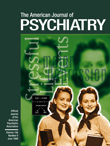Multiples: No Amnesia for Child Abuse
To the Editor: In a landmark study notable for its objective documentation, Dorothy Otnow Lewis, M.D., and colleagues (1) confirmed the noniatrogenic occurrence of dissociative identity disorder (formerly called multiple personality disorder) (2) and the nonimaginary nature of the history of child abuse.
The study is brilliant, but the authors misspoke in their Discussion section when they said that their subjects “had partial or total amnesia for the abuse they had experienced as children.” In fact, as the authors stated in their Results section, it was only “in their usual personality states” that their subjects had such amnesia, implying that their subjects’ other personality states did remember the abuse. Thus, although it might not be evident if you spoke only to the initially presenting personality state, these individuals did remember their traumatic experiences.
The reason I make an issue of the incorrectness of saying that these individuals had amnesia for their child abuse is that this erroneous idea is the basis of much of the skepticism about the disorder. It leads skeptics to erroneously conclude that the disorder involves “repressed memory,” which later becomes “recovered memory.” And they find it entirely implausible that anyone could forget such major experiences and then have the memories pop out decades later. So it is important to make it clear to skeptics that these individuals’ alternate personality states have never forgotten the child abuse, even if their presenting personality states have. With this disorder, memories are not repressed into a Freudian unconscious but are dissociated into alternate states of consciousness (the alternate personality states). The memories are not miraculously recovered decades later but are belatedly shared by the personality states that came into existence when the abuse began and had always had these memories.
Obviously, I am not telling the authors anything they did not know. I just wanted to add a few words of clarification for skeptics.
1. Lewis DO, Yeager CA, Swica Y, Pincus JH, Lewis M: Objective documentation of child abuse and dissociation in 12 murderers with dissociative identity disorder. Am J Psychiatry 1997; 154:1703–1710Google Scholar
2. Nakdimen KA: Renaming multiple personality disorder (letter). Am J Psychiatry 1995; 152:1104Medline, Google Scholar



